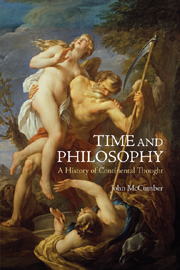Book contents
14 - Badiou, Rancière, and the time of equality
from IV - Onwards, 2011–
Summary
One could be forgiven for thinking that, by 2011, continental philosophy's distinctively temporalized approach, in which everything is mortal, was moribund itself. The anglophone lands remained generally in the grip of philosophical traditionalists, while continental philosophy's original habitat in Germany had dried up decades before. Already in his 2001 Continental Philosophy: A Very Short Introduction, Simon Critchley had characterized Germany as philosophically “becalmed”, while in France, he found only Derrida himself “still very much going strong” (Critchley 2001: 124). and with Derrida's death in October 2004, the last of the great founding thinkers of French postmodernity went off into what Beauvoir had called “formless night”. A certain amount of gloom seemed appropriate.
But gloom is nothing new in philosophy, and the temporalized approach originally pioneered by Heraclitus had known bad times before. The eighty years between Marx and Heidegger had been a dry period broken only by Nietzsche. The period between Heraclitus himself and Hegel had been far longer. Time and again powerful thinkers – thinkers of the stature of Kant, Husserl and Sartre – had summoned their intellects to restore traditional approaches. And yet continental philosophy had come roaring back. Could it not do so again?
FOUR CONTINENTAL PHILOSOPHERS
In this chapter and the next, I shall briefly discuss four contemporary philosophers who show that continental philosophy's temporalized approach is alive and vibrant today: Giorgio Agamben, Alain Badiou, Judith Butler and Jacques Rancière.
- Type
- Chapter
- Information
- Time and PhilosophyA History of Continental Thought, pp. 351 - 372Publisher: Acumen PublishingPrint publication year: 2011



